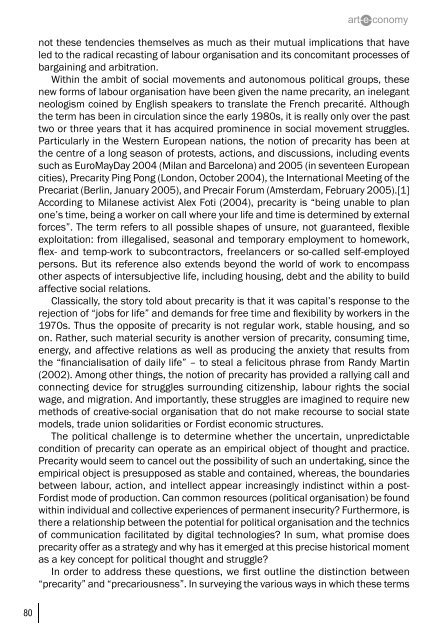art-e-conomy _ reader - marko stamenkovic
art-e-conomy _ reader - marko stamenkovic
art-e-conomy _ reader - marko stamenkovic
Create successful ePaper yourself
Turn your PDF publications into a flip-book with our unique Google optimized e-Paper software.
80<br />
not these tendencies themselves as much as their mutual implications that have<br />
led to the radical recasting of labour organisation and its concomitant processes of<br />
bargaining and arbitration.<br />
Within the ambit of social movements and autonomous political groups, these<br />
new forms of labour organisation have been given the name precarity, an inelegant<br />
neologism coined by English speakers to translate the French precarité. Although<br />
the term has been in circulation since the early 1980s, it is really only over the past<br />
two or three years that it has acquired prominence in social movement struggles.<br />
P<strong>art</strong>icularly in the Western European nations, the notion of precarity has been at<br />
the centre of a long season of protests, actions, and discussions, including events<br />
such as EuroMayDay 2004 (Milan and Barcelona) and 2005 (in seventeen European<br />
cities), Precarity Ping Pong (London, October 2004), the International Meeting of the<br />
Precariat (Berlin, January 2005), and Precair Forum (Amsterdam, February 2005).[1]<br />
According to Milanese activist Alex Foti (2004), precarity is “being unable to plan<br />
one’s time, being a worker on call where your life and time is determined by external<br />
forces”. The term refers to all possible shapes of unsure, not guaranteed, flexible<br />
exploitation: from illegalised, seasonal and temporary employment to homework,<br />
flex- and temp-work to subcontractors, freelancers or so-called self-employed<br />
persons. But its reference also extends beyond the world of work to encompass<br />
other aspects of intersubjective life, including housing, debt and the ability to build<br />
affective social relations.<br />
Classically, the story told about precarity is that it was capital’s response to the<br />
rejection of “jobs for life” and demands for free time and flexibility by workers in the<br />
1970s. Thus the opposite of precarity is not regular work, stable housing, and so<br />
on. Rather, such material security is another version of precarity, consuming time,<br />
energy, and affective relations as well as producing the anxiety that results from<br />
the “financialisation of daily life” – to steal a felicitous phrase from Randy M<strong>art</strong>in<br />
(2002). Among other things, the notion of precarity has provided a rallying call and<br />
connecting device for struggles surrounding citizenship, labour rights the social<br />
wage, and migration. And importantly, these struggles are imagined to require new<br />
methods of creative-social organisation that do not make recourse to social state<br />
models, trade union solidarities or Fordist economic structures.<br />
The political challenge is to determine whether the uncertain, unpredictable<br />
condition of precarity can operate as an empirical object of thought and practice.<br />
Precarity would seem to cancel out the possibility of such an undertaking, since the<br />
empirical object is presupposed as stable and contained, whereas, the boundaries<br />
between labour, action, and intellect appear increasingly indistinct within a post-<br />
Fordist mode of production. Can common resources (political organisation) be found<br />
within individual and collective experiences of permanent insecurity? Furthermore, is<br />
there a relationship between the potential for political organisation and the technics<br />
of communication facilitated by digital technologies? In sum, what promise does<br />
precarity offer as a strategy and why has it emerged at this precise historical moment<br />
as a key concept for political thought and struggle?<br />
In order to address these questions, we first outline the distinction between<br />
“precarity” and “precariousness”. In surveying the various ways in which these terms


